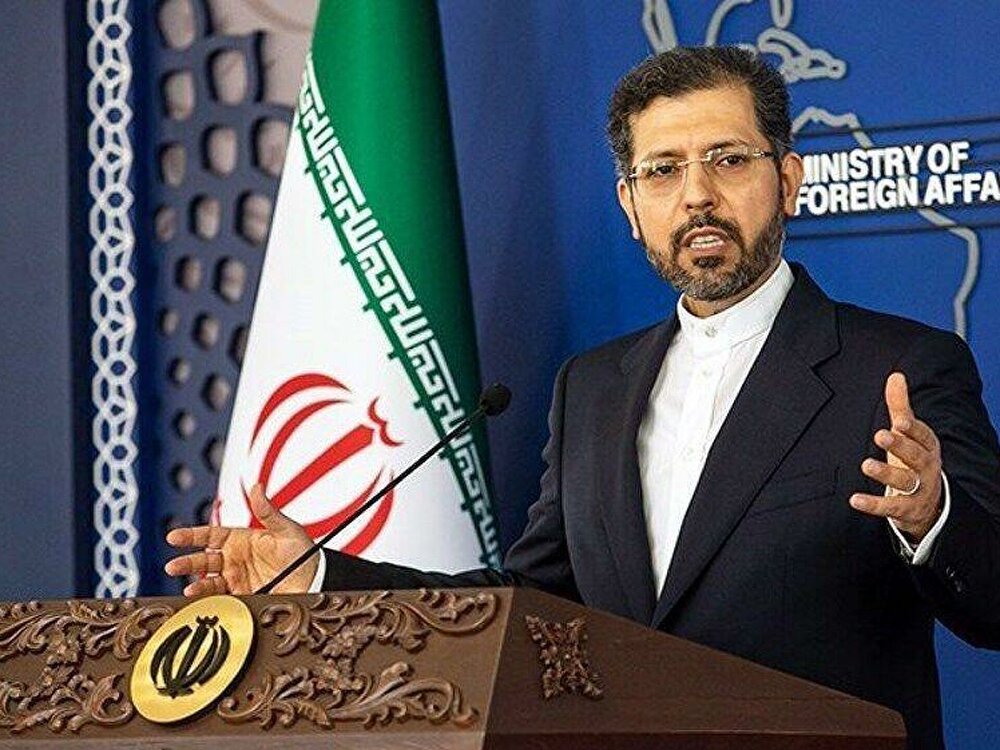Foreign Ministry: Vienna talks are hostage to U.S. partisan and internal affairs

TEHRAN — The United States is solely responsible for the current state of the Vienna talks, Iranian Foreign Ministry spokesman said on Monday.
“Let us all not forget that the government which is in front of us today is not a government that adheres to its obligations. It wants to use legal means to escape performing its duties,” Saeed Khatibzadeh told reporters in his weekly presser.
The spokesman said the United States is trying to hold the remaining issues pertaining to the Vienna talks hostage to its internal affairs.
“Iran and Iranians cannot be patient forever. If the United States wants to reach an agreement, it must make a political decision as soon as possible,” he asserted.
When asked about European Union coordinator Enrique Mora's trip to Tehran, Khatibzadeh said, “During this trip, he carried some points of views and wanted to exchange opinions with us. We told Mora about our issues. Our messages and demands were clear from the beginning. Mora's trip was to get us all out of this situation. Iran tried to use another way to resolve the remaining issues. So far, Iran has had the most initiatives.”
The spokesman continued by saying that Iran is waiting for the other side's response, but it has not received it yet.
On the pause in the talks, the diplomat said it was clear to Iran in the last two weeks that Joe Biden and the White House have not made their decision and have taken the whole agreement hostage to U.S. partisan and internal affairs.
“The Biden administration takes the same approach that has led to the failure of many international agreements, which is to make an international agreement subject to their own internal conflicts. The JCPOA agreement and United Nations Security Council Resolution 2231 are the perfect examples, and it is in this context that the Biden government must make its political decision,” Khatibzadeh noted.
The spokesman said that the United States is responsible for bringing the talks to a halt.
“The solution is in the White House,” he reiterated.
The U.S. must respond logically to Iran's reasonable demands, which are approved by the P4+1 members, so that we are ready to return to Vienna, Khatibzadeh noted.
“An agreement is very much available if the United States understands that we will not cross our red lines or fall short of our demands,” the diplomat asserted.
Responding to a question about the remaining issues in the negotiations, the spokesman said, “It was not at all like we connected the (West Asia) region to the JCPOA."
Iran's benefits from the JCPOA are in accordance with the text of the agreement, and UNSCR 2231 is the main mission of the Ministry of Foreign Affairs, the spokesman said.
“Now, in the final steps, the United States is trying to prevent Iran from benefitting from the various aspects of the JCPOA. We are at a point where the Biden administration wants to follow the failed legacy of the Trump administration or act as a semi-responsible government. International actors see that the Biden government is following the same path of the previous government,” Khatibzadeh pointed out.
Responding to a question, the diplomat said that illegal and unilateral sanctions have become a common practice in the United States.
“The U.S. believes that it is the police of the world and the domestic laws of this country are international laws. Bullying will not work,” the spokesman remarked.
Khatibzadeh once again reiterated that Iran’s red lines are the interests of the people and the benefit of what was once discussed.
“The whole deal depends on Washington's political decision. This has been the situation for weeks now. It is a matter of individuals and entities that should be removed from the sanctions list according to the JCPOA, in addition to Iran's economic benefits from the deal. These are issues that are delaying Washington's political decision,” he stressed.
The diplomat stated that the Biden government must show that it is the true representative of the American people.
“We have not yet received the final answer from Washington, and if Washington's answer is appropriate, we can go to Vienna as soon as possible with the points raised, not for new negotiations, but to finalize the agreement. The response and signal must come from Washington,” the spokesman concluded.
Talks in Vienna over reviving the 2015 Iran nuclear deal have come to a standstill due to the Biden administration’s inability to make tough political decisions.
Leave a Comment